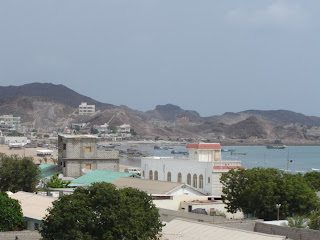Life in
Dr.Thomas Antony
It was lunch time, the sun at its peak, and I was just about to enter our residential building. Just then I saw a shining Land Cruiser parked opposite to the gate, on an otherwise empty road, and a few westerners walking around, taking photos. I wondered if they were trying to locate the sea through some gap amid the buildings, when one gentleman wished me in Arabic. I returned the greeting and gestured to them how they could go to the beach. "Oh, you speak English!” He seemed surprised as he walked towards me. The others were three middle aged plump ladies in T-shirts and pants chatting with a local person.
He said he was Irish, now retired from a bank. The ladies with him were British. They 
By the beach he could find the old house where his tender memories lived. Occupied by natives, there was a tall compound wall around it now. It had been just a fence earlier. He was upset he was not allowed even a walk around the house by its present resident. That freedom cannot be allowed now; it is considered an intrusion into their privacy. Life has changed much and the old sparkle is gone.
The British came here in 1839, made
North and
The colours of western civilization left by the British occupation and the socialist regime in 
One sees people from many countries in this place. Some have come for work, while others have integrated well into the society. Many Yemenis have studied abroad and could pick their life partners from there. Yemenis have taken wives from
History of this place dates back 3000 years. I read an article where it says this place is mentioned in the Book of Ezekiel. This is part of the
Because of its strategic position
In spite of its rich culture and traditions,
However, the average Yemeni manages to remain happy. It is very rare to see them quarrel or fight. It is difficult to find rudeness or arrogance in them. If you hear shouts or loud conversation, be assured it is a crowd dispersing after a football match. Don’t let a row of cars with head-lights on and blaring horns panic you; it is a wedding motorcade. Armed with a politeness to disarm you, their pleasant high-spirited nature is transparent. There is an air of tranquility around. Before you know it, you begin to feel at ease with them. And then you realize they are the embodiment of patience. Once, waiting at
quarrel or fight. It is difficult to find rudeness or arrogance in them. If you hear shouts or loud conversation, be assured it is a crowd dispersing after a football match. Don’t let a row of cars with head-lights on and blaring horns panic you; it is a wedding motorcade. Armed with a politeness to disarm you, their pleasant high-spirited nature is transparent. There is an air of tranquility around. Before you know it, you begin to feel at ease with them. And then you realize they are the embodiment of patience. Once, waiting at

No comments:
Post a Comment